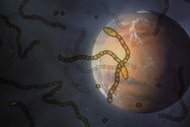Create a free profile to get unlimited access to exclusive videos, sweepstakes, and more!
Are all the aliens hanging out in some eldritch realm deep underwater?

As we wonder where all the aliens could be crawling around, maybe it's worth considering that they might not creep and crawl at all. They might be swimming in a subsurface ocean, where they have no idea the universe above even exists.
It sounds almost Lovecraftian, but planetary scientist Alan Stern believes that our best chance of finding extraterrestrial life is beneath layers of rock and ice in the subsurface oceans of bodies like Europa or Enceladus. Because there are a number of these types of worlds in our solar system, they might be common in other star systems. Worlds with surface oceans, like Earth, need to be closer to their stars to be habitable — but life could potentially survive in the depths of frozen orbs that are much further from their stars.
“Because these oceans can be very far away from their parent star, it vastly expands our concept of ‘habitable’,” said Stern, who recently presented a paper that might forever change your mind about aliens at the 52nd annual Lunar and Planetary Science Conference.
Think about it. Earth got lucky. In 4.5 billion years, our planet has survived almost every existential threat except a supernova. It supposedly took a beating from another protoplanet when it was a protoplanet itself (and still has the remnants of that collision deep in its mantle). Through all the cosmic trauma it experienced, from its violent birth to asteroids throwing lethal punches that wiped out more than just the dinosaurs, Earth has held up. Not to mention that the Sun is a middle-aged star, which hasn’t gone red giant and swallowed us up. At least we have another 7 to 8 million years before it opens its fiery jaws and comes for us.
Stern argues that planets like Earth must be rare. Bodies with surface oceans face constant threats from space, and if Mars could speak, it would vouch for that. It is much more likely that life on a cryo-world with liquid oceans beneath miles of ice and rock would survive coronal mass ejections and passing through molecular clouds that bring on a deep freeze. Rogue planets could potentially host life. Anything living so far beneath the skin of a moon or planet would be unfazed by phenomena on the outside, meaning that the surface temperature could plummet to absolute zero and it would still be lurking at the bottom of the ocean like nothing happened.
“Planetary scientists expect to be surprised because we find ourselves constantly taken aback by the planetary types not expressed in our own solar system,” Stern said. “We can expect to find many other kinds of biology out there. Our kind is used to our particular situation, which is why many believe it might exist somewhere else, but we should just keep our eyes open and expect the unexpected.”
There is also the question of what these strange hypothetical worlds would be like beneath the literal and proverbial surface. Stern prefers the analogy of knowing nothing but a desert island and being blown away from all the flora and fauna you would discover if you just got around the rest of Earth for a while, never mind the universe. Now imagine alien beings that might not even grasp the concept of air. They may or may not have subsurface civilizations like Lovecraft’s dreadful and blasphemous R’lyeh, but say these life-forms are more than microbes and actually have a brain.
Spaceflight would be unfathomable for creatures that need to carry so much water with them to stay alive. It would also be highly unlikely that intelligent alien things from the deep would try to reach out to other planets by sending messages, because they would be unaware that any existed. It would not be possible for any technological signals to escape the ice. Because organisms like this would evolve to breathe underwater, they would stay there with no knowledge of anything beyond, so breaking the surface would be a shock. What would they even think if they saw stars?
“If the universe at all follows the pattern in our solar system, with most worlds having oceans on the inside, those oceans are probably more stable environments to life,” said Stern. “Most of the life that would evolve [would] be in those oceans and completely sequestered from knowing there’s a universe.”
To find out what lies beneath, what we need is evidence. Plumes of water vapor from Europa and Enceladus could be signs of hydrothermal vents in their darkest depths. Stern, who is involved in the ultraviolet spectrometer team for NASA’s upcoming Europa Clipper mission, believes that we need autonomous remote sensing spacecraft built to withstand perilous waters. Europa Clipper takes off in 2024. He is anxious to see if anything is waiting to be found without actually knowing someone from a faraway planet is trying to find it.
“I really wish I could be around for another 300 years,” he said. “I have a feeling there must be something.”




























